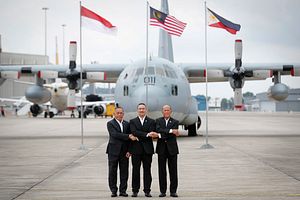Last week, Indonesia’s defense minister said that Indonesia, Malaysia, and the Philippines planned on holding a joint land patrol exercise next month. The development, which has been a long-mulled step within trilateral collaboration between the three countries which has taken shape in recent years, deserves emphasis as part of ongoing minilateral security collaboration in Southeast Asia.
As I have noted before in these pages and elsewhere, one of the key developments in minilateral collaboration in Southeast Asia in recent years has been the advancement of trilateral cooperation between Indonesia, Malaysia, and the Philippines. Following intensifying discussions after a spate of kidnappings of nationals by militant groups in mid-2016, collaboration took shape as the Trilateral Cooperative Agreement (TCA) in 2017 and into 2018, with maritime and air patrols and the setting up of hubs for operations in each country.
One of the aspects that had been closely watched with respect to the TCA’s expansion had been the addition of a ground component to complement the maritime and air elements where collaboration had been previously forged. Through 2018, officials had indicated amid the holding of trilateral meetings that there was an intention to build out the land component of cooperation in addition to the air and sea. And as with previous iterations, the TCA was in the spotlight again at this year’s Shangri-La Dialogue (SLD) in Singapore a few weeks ago, where Indonesian Defense Minister Ryamizard Ryacudu indicated that trilateral collaboration was poised to enter a new phase with the holding of a joint ground exercise, and the defense ministers from the three countries also met on the sidelines of the summit in discussions that touched on this as well.
This week, this aspect of ongoing trilateral collaboration between the three countries was in the headlines again when Indonesia confirmed that the three countries have indeed agreed to conduct a month-long joint land exercise in the coming months in Tarakan in North Kalimantan. In remarks reported in local and international media outlets, Ryacudu indicated on June 12 that the exercise would be designed to boost joint collaboration in land border areas to address a wide range of transnational challenges, with a particular focus on terrorism with continuing fears about Islamic State-linked militants in the region.
In terms of details of the upcoming exercise, The Jakarta Post, on June 17, quoted ministry spokesperson Totok Sugiharto as saying that the exercise, expected to be held next month, is expected to see each country deploying a company of troops and a few observers. The drills are expected to include training on areas such as shooting and close-range combat, with a focus on familiarizing each side with their capabilities as well as the terrain for potentially more complex and involved engagements further down the line.
Specifics still remain unclear on the operationalization of the drills as well as what they mean for the future development of trilateral Sulu Sea patrols more generally. Details have not been confirmed by all three sides formally, including the exact timing of the exercise, specific personnel numbers, and the location. And while there has been talk about more robust future measures including deploying a joint land force into areas such as the southern Philippines, Ryacudu has been more cautious in his recent statements, noting that the process would proceed incrementally, with the involvement of other actors including the foreign ministries as well as a step-by-step approach to the conduct of drills to allow for the working out of specifics that would manage some of the challenges that remain.
Nonetheless, the development of the ground component of trilateral collaboration between the three countries in this realm deserves emphasis. Talk of the exercise is the latest in a series of incremental, long-mulled steps in what is one of the more promising manifestations of Southeast Asian minilateral security collaboration, whatever the limitations and challenges that remain. Seen from that perspective, how the three countries and the wider region continue to develop this mechanism will continue to be significant to monitor in the coming months and years.
































